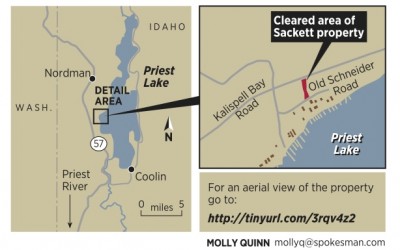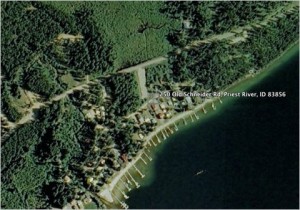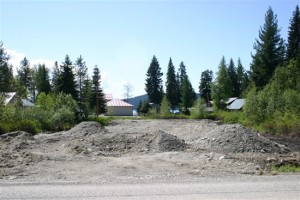By Scott W. Winchell
When is enough regulation, enough? When it comes to the EPA, and environmentalists, there is never enough, and they have the ability to completely remove your property rights, even in a capricious and arbitrary manner. When is a person’s property no longer theirs to do with as they may, even after playing with in the proscribed rules and laws outlined in the permit promise locally? The answer to that question and more is what the Supreme Court of the United States (SCOTUS) is about to judge after hearing arguments yesterday; Sackett vs. EPA. The case is said to be many things, depending on who you ask, but the issues are: were the EPA and its agents capricious and arbitrary, what recourse (due process) exists for those who receive an order they believe is in error, and has the liberty and rights of the property owner been summarily usurped?
Why is there an EPA?
In the macro, we must ask ourselves whether or not human beings are part of nature, or are we a cancer that is here only to ruin the planet? To rabid environmentalists, we are indeed a cancer and cannot be proper stewards of the planet, if we even belong here at all. Everything we do as humans as determined by these people is ruinous, from our simple bodily functions of evacuating our bowels, bladders, and lungs, to where we live and build. To many, we are too numerous, so our very numbers are ruining the planet and the atmosphere by just being here and breathing.
Let’s add into the mix the stipulation that we have large brains and can therefore out-think all other creatures and our nature, to these folks, is to just consume, dominate, waste, and kill. The elite among the environmentalists have taken on every aspect of preserving everything but man. Whether its the Snail Darter or the Delta Smelt in the Central Valley of California, the spotted owl in the Pacific Northwest or lobsters off the coast of Maine, there are rules and regulations. But perhaps the biggest regulations of all govern our air and water.
We all want and need clean air and clean water and granted, many among us are very guilty of ruining the environment, especially in the creation of our industries from power plants to automobiles, to chemicals and pesticides, to nuclear power, to petroleum products, and on, and on. So we created ways to control those without consciences, or enough smarts to realize their actions are harmful to all, including themselves. Hence, we created the Clean Air Act of 1970, the Clean Water Act of 1977, and numerous other laws, rules, and regulations to clean up previous messes, and prevent future ones.
Overreach, capriciousness, and arbitrary control
A further question isn’t whether or not it was a good thing the EPA was created to enforce these regulations, but to what extent and cost? At some point, we start to reach the point of diminishing returns and expanding further may do a small amount of good, but at extreme cost and loss of liberty, and the right to pursue happiness. In a time when the excess of regulation is a key topic in debates for political office to a ruined economy (yes people ruin other things too), we have the Sackett vs. EPA case heard by SCOTUS yesterday (Read the transcript here).
We have entered a time and place where overzealous government regulators, many with complete impunity, can determine not only whether or not you have violated the law, or what laws and rules they will enforce by fiat, but to give you no recourse but financial ruin and worse is simply too much power. All this with no recourse. In this case we see two major players, those who think government has gotten too big and too strong, and those who think we need more regulation and control over our neighbors.

The vertical barren grey area is the lot in question - notice the other lots and roads around it. (Google Earth)
In this case, it is hard not to ask, who was the EPA Agent who first visited the property, why did they even go to look at it – all questions not being discussed? But we all know its usually personal at the local level. Did a neighbor complain because they did not want another house in the neighborhood? Did the Sacketts have enemies they did not know? It stretches credulity that an EPA Agent, of their own volition, thought it was so important to look at this very small residential lot, and then to convey the harshest maximum threats of fines. Something stinks on that level all by itself.
Opposing sides, defending the EPA, and suffering because of the EPA
Two opinions are before SCOTUS now and to hear each is to disbelieve the other. The Kootenai Environmental Alliance, a very avid environmentalist group in the Northwest posted this article and comments on the Sacketts, and labels the other side as ideological; the pot calling the kettle black. Please read closely, especially the analogy they use and the conclusion they draw from it:
What The Priest Lake Wetland Case Is Actually About
The Sacketts have challenged a structural legal problem in enforcement of the Clean Water Act. Fundamentally, the EPA says there are wetlands on the property, the Sacketts say there are no wetlands. The question at the Supreme Court is essentially how that dispute gets resolved. The Sacketts say they should get to affirmatively go to court to immediately decide it. The EPA, and the lower courts, say the actual language in the law does not allow such a court challenge. Instead the Clean Water Act suggests that Sacketts can get a permit or they can defend against an enforcement action in a court. It is a major case because a wide range of environmental and other federal statutes are structured similarly.
An imperfect but illustrative analogy is that a speeder is pulled over for going 70 mph in a 55 mph zone. The speeder points to a sign, directly in front of the cop, that says “Speed Limit 70.” The cop issues the ticket anyway. The traditional remedy is that you appeal the ticket in Court. The Sacketts, however, are essentially arguing that they should get to go to court to dispute the facts before the cop even issues the ticket.
The case does raise an interesting question of fairness and “due process” perhaps. The Sacketts argue that the EPA determining that there are wetlands on their property means they either need to get a permit, which can be expensive, or they can be appeal a wetland violation in court, which can also be expensive. However, in truth, due diligence by the landowner, along with competent and honest advice from lawyers and land development professionals, will almost always avoid these wetland problems. (Mike Sackett, an excavation contractor of all things, should know this.)
Instead, in this case, we have an ideologically driven lawsuit by the ideologically driven Pacific Legal Foundation which may or may not decide a fine point of Clean Water Act enforcement procedure. So, don’t believe the hype. To be completely clear, what is not in dispute in the Supreme Court case is: wetlands are regulated; EPA and the Corps of Engineers have regulatory jurisdiction and authority; if you fill wetlands you need a permit; and if you fill wetlands without a permit you are violating the law and you are subject to enforcement. When you get your day in court is the only issue to be determined.
To the Kootenai Environmental Alliance, the Sacketts should have known better and done more due diligence and that by challenging the ruling, with their supporters at the Pacific Legal Foundation are practicing hyperbole for ideological reasons. The problem seems simple to them, that the Sacketts need to go to court and have it adjudicated, after they received the so-called ‘ticket’. They argue that the Sacketts wanted to try the case prior to receiving the ‘ticket’, no matter how capricious or arbitrary. The problem is, the EPA offers no such remedy. To employ their analogy further, the Sacketts have to not only receive the ticket, but in this case, they have to pay the fines, pay for the remediation ordered, and then apply for a permit, or argue their case in a court after ward.

The cleared lot - notice the proximity to neighbors' buildings and compare the lot as described in the other posted images in this article.
This is clearly a case of “guilty until proven innocent”, and at a very steep price, and after suffering great harm. The Sacketts have waited years, and all agree they have suffered greatly on many levels. After-all, the EPA levied the maximum penalty on them as if they were pouring poison into a reservoir while spewing acid into the air. The case is about them filling a small area on their property the EPA agent determined was a wetland, a very broad term and definition. To read the definition, one would think any puddle on Earth created by rain is a vernal pool, and is therefore a wetland. Standing water in your driveway could mean losing your home with that logic.
The analogy’s logic they employ is that you have to pay the speeding ticket then argue the case. So by capricious and arbitrary fiat, the Sacketts have to spend more money than the land was worth to get a chance to have the same federal agency determine their guilt and/or their future abilities on land they own. That is a bar far to high for any citizen, especially when the courts already accord deference to the agency because they are the experts, and the agency has unlimited resources and time to defeat anyone. On top of that, the citizen has to fight against the personal will of the agent, no matter how zealous he/she may be; that is the arbitrary nature of this case.
The greatest failure of their logic though is this, the Sacketts did their due diligence by applying for and receiving a county permit prior to work being performed. They had no obligation to prove a negative by seeking other permits not determined to be needed by the very county they lived in. How is a land owner supposed to know that an EPA agent could arbitrarily shut them down, charge exorbitant fees and fines, after doing what they were supposed to do?
Once again the ultra-environmentalists try to cast the argument in a very narrow manner, but to look at the property by any reasonable standard would never raise an eyebrow of the common law-abiding citizen. After-all, the property is bordered by two roads, front and back, and neighbors’ homes are situated on each side and across the street on the shores of the lake. Maybe there are Delta Smelt in a puddle on the property.
This is clearly a case that SCOTUS must judge in favor of the Sacketts and all citizens in a resounding manner. It needs to be adjudicated beyond the usual tendency for a narrow defined decision that will only raise future cases, and ruin others’ lives. This must be settled now.

